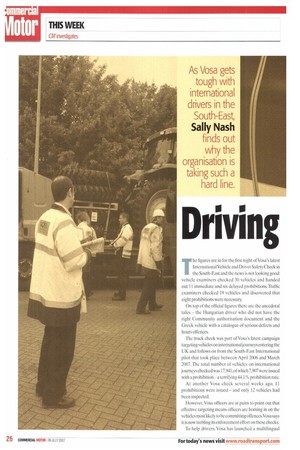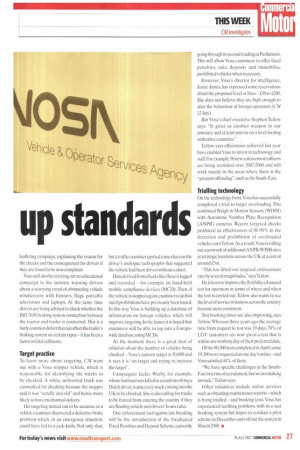Driving
Page 26

Page 27

If you've noticed an error in this article please click here to report it so we can fix it.
up standards
The figures are in for the first night of Vosa's latest International Vehicle and Driver Safety Check in the South-East and the news is not looking good: vehicle examiners checked 30 vehicles and handed out 11 immediate and six delayed prohibitions. Traffic examiners checked 19 vehicles and discovered that eight prohibitions were necessary.
On top of the official figures there arc the anecdotal tales — the Hungarian driver who did not have the right Community authorisation document and the Greek vehicle with a catalogue of serious defects and hours offences.
The truck check was part of Vosa's latest campaign targeting vehicles on international journeys entering the UK and follows on from the South-East International pilot that took place between April 2006 and March 2007. The total number of vehicles on international journeys checked was 17,941,of which 7,907 were issued with a prohibition — a terrifying 44.1% prohibition rate.
At another Vosa check several weeks ago, 11 prohibitions were issued — and only 12 vehicles had been inspected.
However. Vasa officers are at pains to point out that effective targeting means officers are homing in on the vehicles most likely to be committing offences.Vosa says it is now trebling its enforcement effort on these checks.
To help drivers, Vosa has launched a multilingual leafleting campaign, explaining the reason for the checks and the consequences for drivers if they are found to be non-compliant.
Vosa will also be carrying out an educational campaign in the autumn, warning drivers about a worrying trend of obstructing vehicle windscreens with banners, flags, portable televisions and laptops. At the same time drivers are being advised to check whether the ISO 7638 braking system connection between the tractor and trailer is connected. This is a fairly common defect that can affect the trailer's braking system on certain types — it has been a factor in fatal collisions.
Target practice
To learn more about targeting, CM went out with a Vosa stopper vehicle, which is responsible for identifying the trucks to be checked. A white, unliveried truck was earmarked for checking because the stopper said it was "scruffy and old" and hence more likely to have mechanical defects.
His targeting turned out to be accurate as a vehicle examiner discovered a defective brake problem which, in an emergency situation, could have led to a jack-knife. Not only that, but a traffic examiner spotted some clues on the driver's analogue tachographs that suggested the vehicle had been driven without a chart.
Data derived from checks like these is logged and recorded — for example on hand-held mobile compliance devices (MCD). Then, if the vehicle is stopped again,examiners can find out if prohibitions have previously been issued. In this way Vosa is building up a database of information on foreign vehicles, which will improve targeting. In the future it is hoped that examiners will be able to tap into a Europewide database using MCDs.
At the moment there is a great deal of criticism about the number of vehicles being checked — Vosa's current target is 50,000 and it says it is "on target and trying to increase the target".
Campaigner Jackie Warby, for example, whose husband was killed in a crash involving a Dutch driver,wants every truck coming into the UK to be checked. She is also calling for trucks to be barred from entering the country if they are flouting vehicle and drivers' hours rules.
One enforcement tool against law breaking will be the introduction of the Graduated Fixed Penalties and Deposit Scheme, currently going through its second reading in Parliament. This will allow Vosa examiners to offer fixed penalties, take deposits and immobilise prohibited vehicles when necessary.
However, Vosa 's director for intelligence, Janice James, has expressed some reservations about the proposed level of fines— £30 to £200. She does not believe they are high enough to alter the behaviour of foreign operators (CM 12 July).
But Vosa's chief executive Stephen Tetlow says: "It gives us another weapon in our armoury and at least puts us on a level footing with other countries."
Tetlow says efficiencies achieved last year have enabled Vosa to invest in technology and staff. For example,90 new enforcement officers are being recruited over 2007/2008 and will work mainly in the areas where there is the "greatest offending", such as the South-East.
Trialling technology
On the technology front, Vosa has successfully completed a trial to target overloading. This combined Weigh in Motion Sensors (W1MS) with Automatic Number Plate Recognition (ANPR) cameras. Recent targeted checks produced an effectiveness of 80-90% in the detection and prohibition of overloaded vehicles, says Tetlow. As a result,Vosa is rolling out a network of additional ANPRIWIMS sites at strategic locations across the UK at a cost of aroundi5m.
"This has lifted our targeted enforcement rate by several magnitudes," says Tetlow.
He is keen to improve the flexibility of annual test for operators in terms of where and when the test is carried out. Tetlow also wants to see the level of service in stations across the country become more consistent.
Test booking times are also improving, says Tetlow. Whereas three years ago the average time from request to test was 19 days, 70% of LGV customers are now given a test that is within one working day of their preferred date.
Of the 80,300 tests completed in April, some 19,300 were requested at one day's notice —and Vosa satisfied 44% of these.
"We have specific challenges in the SouthEast in terms of recruitment, but we are making inroads," Tetlow says.
Other initiatives include online services such as obtaining maintenance reports —which is being trialled — and booking tests. Vasa has experienced teething problems with its e-test booking system but hopes to conduct a pilot scheme in December and roll out the system in March 2008. •
























































































































































































